Monthly Journal
August 2022
International Press Review
The most relevant events of the area through international sources
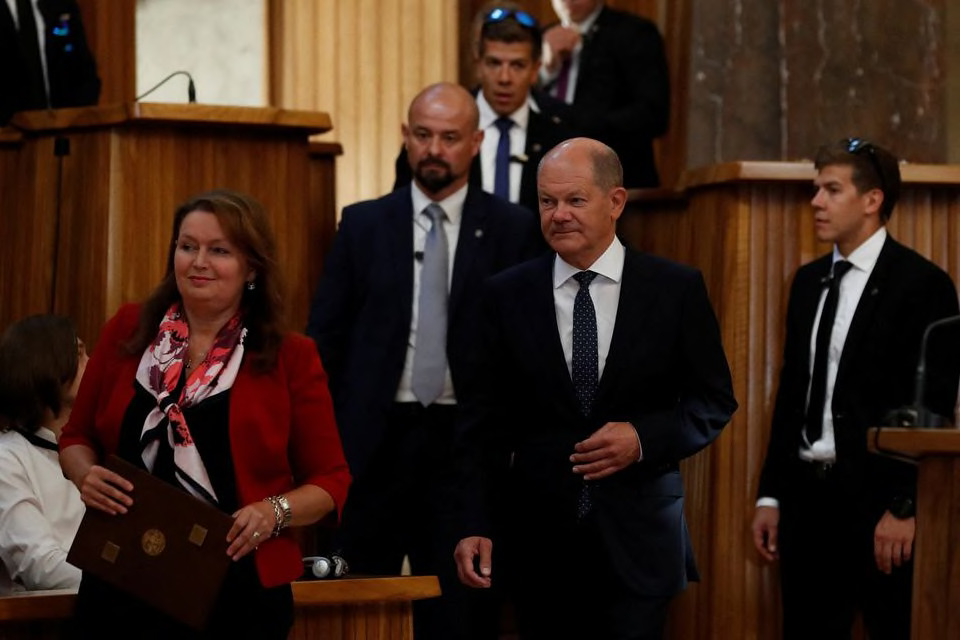
Germany’s Scholz pledges to support Ukraine “for as long as it takes”
Reuters
German Chancellor Olaf Scholz backed once again EU membership for the Western Balkans, Moldova, Georgia, and Ukraine. Scholz remarked that “their EU admission is in our interest” during a speech at Charles University in Prague. Scholz also supported Macron’s idea for a new approach to EU enlargement, involving the creation of a “political European community” first.
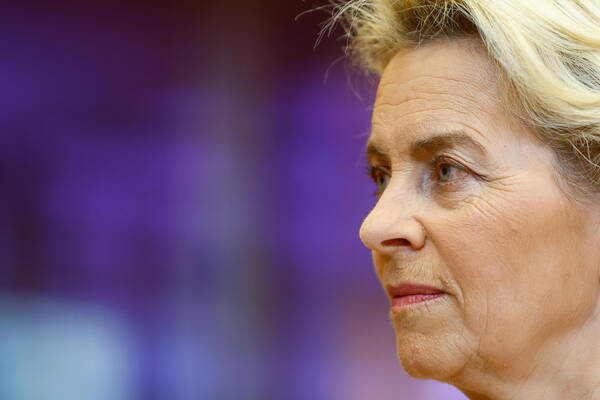
Balkans: Von der Leyen, need to push economic integration
Ansa
EU Commission President Ursula Von der Leyen stated at the Bled Strategic Forum that Balkan countries are “part of the European family,” without indicating a clear timeframe for their accession, but noting that “we must strengthen the credibility of the accession process.” “In recent years, progress has been slowed, not least by international actors, including Russia, who seek to undermine democratic institution building and the rule of law,” she said.
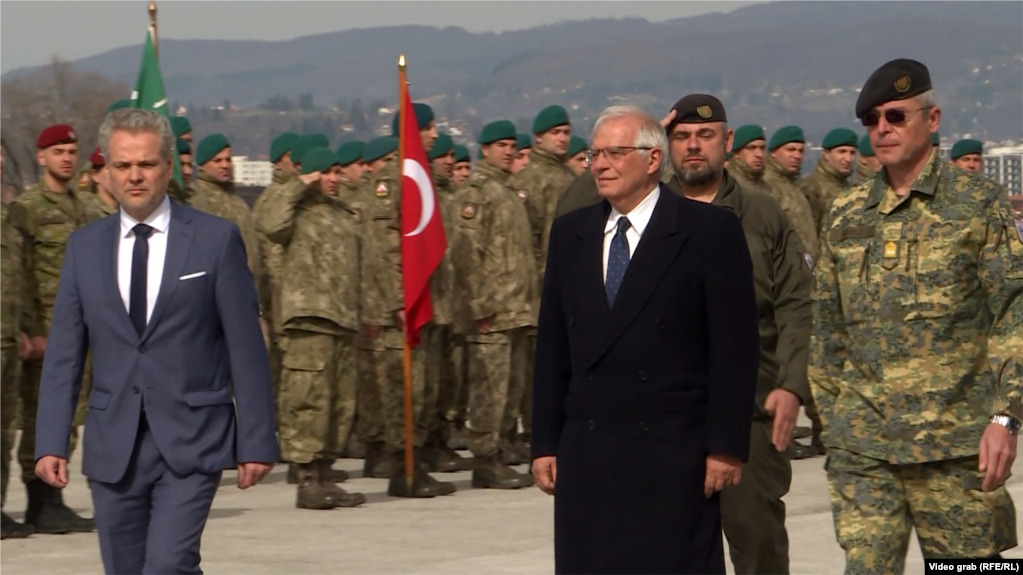
German troops rejoin EU’s Bosnian mission, sparking Russian anger
Radio Free Europe
Germany dispatched troops to Bosnia for the first time in a decade as NATO and the EU feared the Ukraine crisis would spread to the Western Balkans. Immediately after, the Russian embassy in Sarajevo alleged German troops are part of a US-British effort to “prepare the ground for a creeping” integration of Bosnia into NATO. Days after Russia invaded Ukraine, the EU doubled its EUFOR peacekeeping force from 600 to 1,100 troops by sending in reinforcement.
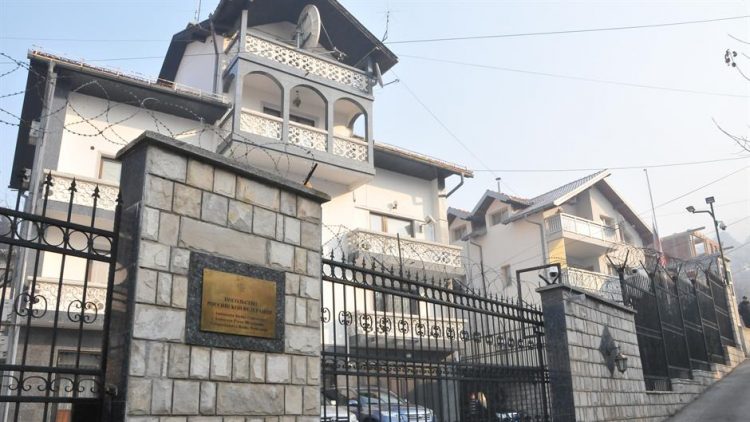
Russia ‘deeply disappointed’ with Bosnia’s participation in Crimea Platform
N1
The Russian embassy to Bosnia and Herzegovina said it was “deeply disappointed” by Bosnian Presidency Chairman Sefik Dzaferovic’s participation in the Crimea Platform summit, calling the decision “unbalanced” and passed without consensus. Dzaferovic addressed the so-called ”Crimea Platform“ via video link, reiterating Bosnia’s support for Ukraine’s sovereignty and territorial integrity. Dzaferovic attended despite objections from pro-Russian secessionist Milorad Dodik, who claims Bosnia should be completely neutral concerning the conflict.
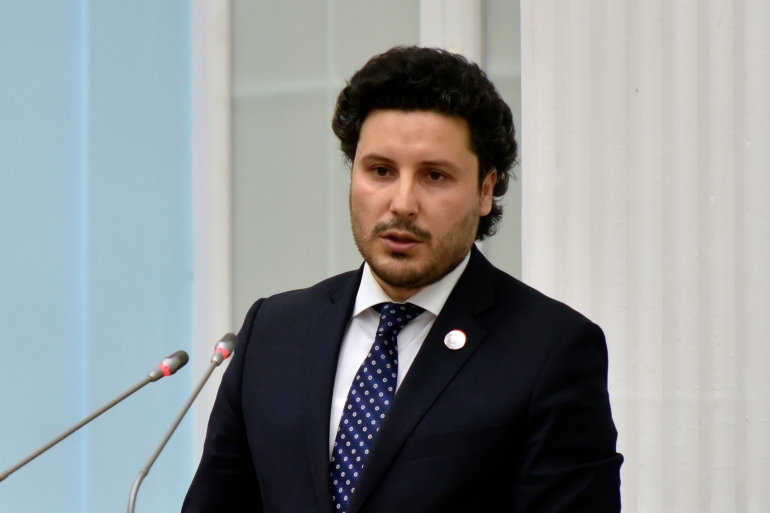
Montenegro government loses no-confidence vote
Al Jazeera
Montenegro’s government led by Dritan Abazovic toppled this month by a non-confidence vote in the Parliament. Political tensions have been smouldering in Montenegro for weeks after the government signed a historical agreement that regulates the relations between the state and the Serbian Orthodox Church (SPC). The accord included provisions to regulate hundreds of SPC properties, with Montenegrin nationalists denouncing it.
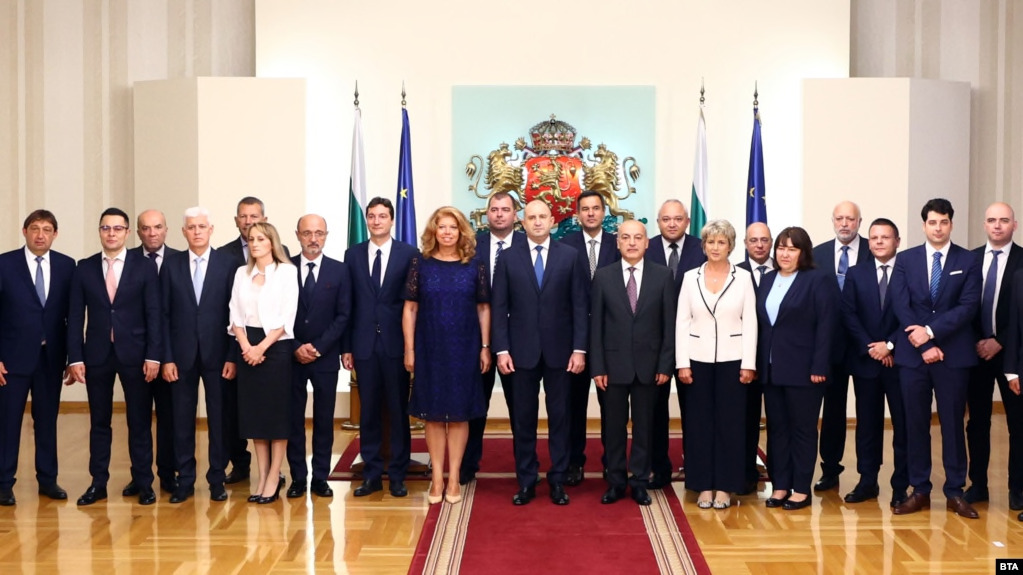
Bulgaria’s caretaker cabinet sworn in after government collapse
Radio Free Europe
After the fall of pro-Western Prime Minister Kiril Petkov’s coalition government in late June, a caretaker government, led by Prime Minister Galab Donev, was sworn in on August 2 in Bulgaria. After just half a year in power, Petkov’s liberal-socialist coalition lost a no-confidence vote and was forced to resign in spring. The October elections will be the fourth in Bulgaria since 2021. President Rumen Radev urged Donev’s interim government to focus on energy and food security, “skyrocketing prices”, and corruption.
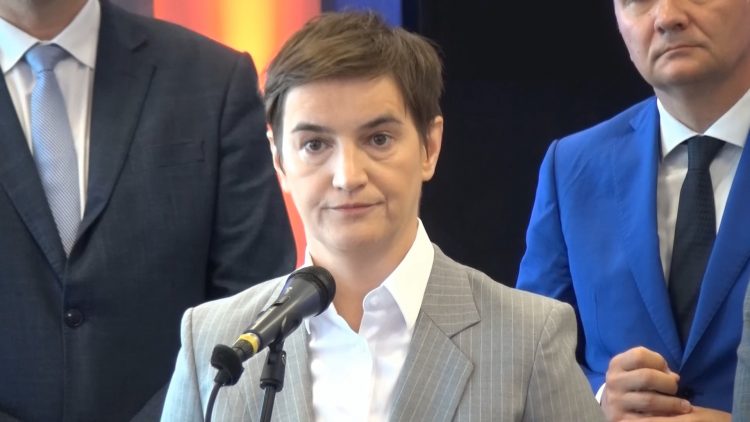
Brnabic: Croatia threatening to block Serbia’s path to EU
N1
The trial of four Croatian officers accused of firing rockets at a column of Serbian refugees in August 1995 during Operation Storm should be scheduled soon in Serbia, and it is already provoking new tensions between Zagreb and Belgrade. The two attacks killed 12 civilians, including four children. Croatian Parliament Speaker Gordan Jandrokovic said Zagreb would use EU accession talks to send a message that it won’t tolerate the indictment, a position shared by many in the government. Serbian Prime Minister Ana Brnabic said Croatia “now officially threatens” to block Serbia’s EU path.
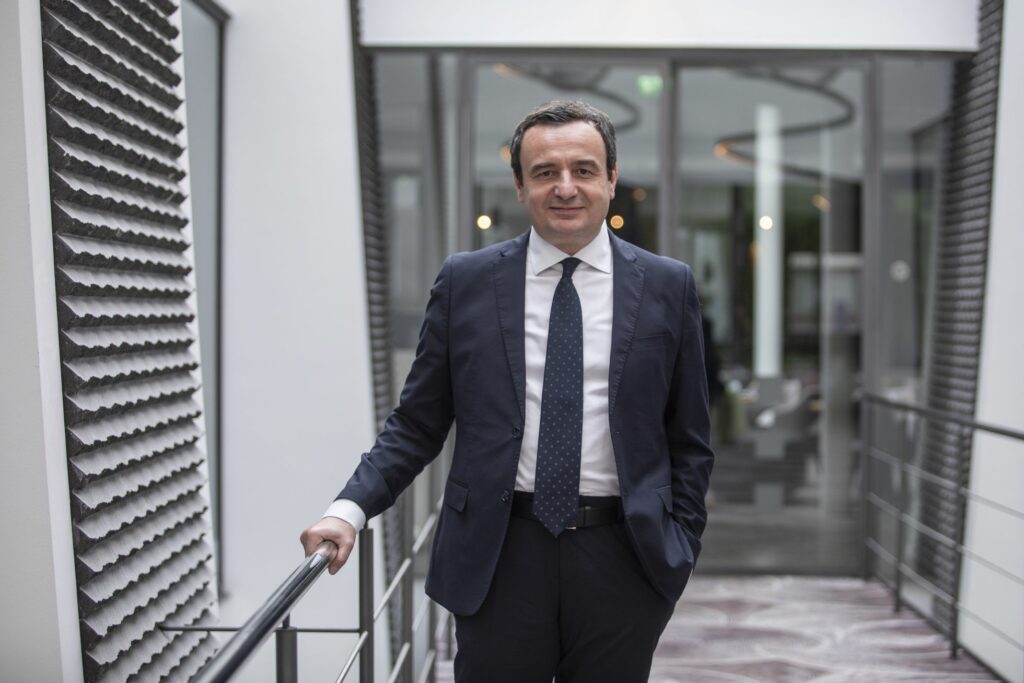
Albin Kurti, primer ministro de Kosovo: “Rusia presiona para aumentar la inestabilidad en las fronteras de la UE”
El Pais
Kosovo’s PM Albin Kurti told El Pais that Spain should recognise Kosovo’s independence because Catalonia and the Basques regions differ from Kosovo. “As our great writer Ismail Kadare said, Spain should never compare itself to Serbia because Serbia committed genocide in Kosovo. I believe that precisely by recognising Kosovo, Spain will prove that Catalonia and the Basques are different cases.” Spain is one of the five EU countries still not recognising Kosovo as an independent state, together with Greece, Slovakia, Cyprus and Romania.
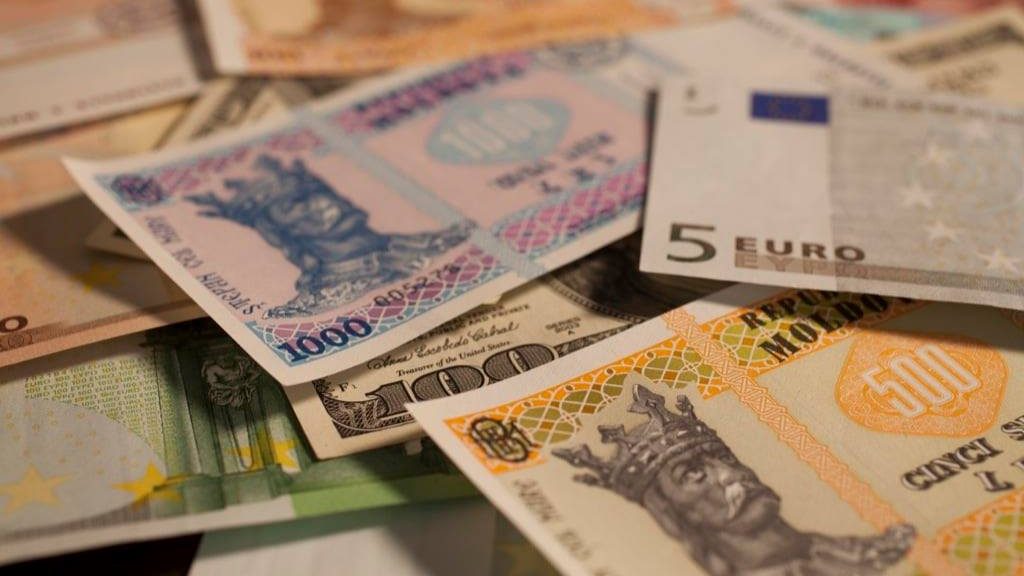
Record inflation piles pressure on Moldovan government
Balkan Insight
Moldova’s inflation rate reached a record 33.5 per cent, hurting an already impoverished population and pressuring the pro-European government of Prime Minister Natalia Gavrilita. The energy crisis and fallout from Russia’s war in Ukraine have severely disrupted Gavrilita’s plans, forcing Chisinau to divert money initially earmarked for investment and development to offset gas prices and bank loans.
The Insight Angle

Jasmin Mujanovic
Political scientist and among the most influential analysts in the Balkans. He holds a PhD in Southeast European & Global Affairs and is former Assistant Professor of Political Science and Policy Studies at Elon University.
He is the author of “Hunger & Fury: The Crisis of Democracy in the Balkans”.
At the end of July, new severe tensions were reported in Kosovo’s north, and in August, a critical round of dialogue between Belgrade and Pristina crumbled once more. Do you believe Serbia and Kosovo will ever reach an agreement? And how could the international community advocate for it?
We need to recognise that the fundamental barrier to normalisation between Serbia and Kosovo is that Belgrade, and Serbian society more broadly, have yet to accept the historical and political facts of the Yugoslav dissolution. Unfortunately, the mainstream opinion among both Serbian leaders and most of the Serbian public remains categorically revisionist as to the origins of Yugoslavia’s implosion, and the chief architects of those events and the conflicts which followed as a result. Until these facts change, it is difficult to imagine any kind of permanent solution to the current impasse. What the political West can do, in the interim, is to ensure full recognition for Kosovo among the entirety of the EU and NATO membership, which is frustratingly still not the case, while ensuring that the possibilities for a resumption of armed conflict in the region remain categorically unavailable.
Bosnia and Herzegovina will hold general elections soon. Several factors are upsetting in a country that has fallen behind in the EU integration process, including the destabilising role of secessionist and pro-Russian Dodik and HR Schmidt’s contentious proposal for electoral reform. Last but not least, the HDZ’s increasingly nationalistic posture in BiH, which dreams of a third Croat entity. How would you assess the country’s current situation and what to expect after the elections?
Bosnia is in a protracted political crisis in which the secessionist aspirations of the SNSD regime in Banja Luka and the increasingly insurrectionary antics of the HDZ are, really, part of one joint assault on the sovereignty and territorial integrity of this state, and not only because both enjoy the patronage of Moscow. After October 2, the HDZ will seek to prevent government formation at both the Federation entity – where it has been doing the same since 2018 – and at the state level. The SNSD will support them in these efforts. The aim will be to force the international community and leaders in the “pro-Bosnian” camp to accept and implement the party’s preferred “reforms” of Bosnia’s electoral laws, by making them still more sectarian, discriminatory, and unrepresentative than the existing regime. Whether they succeed depends on the degree of political capacity within the pro-Bosnian camp, and the views within key Western capitals.
Moscow has an influence in some Balkan countries and regions, including the entity of Republika Srpska in BiH and, Serbia, an EU candidate country. How dangerous is the relationship between Moscow, Banja Luka, and Belgrade right now?
Banja Luka is Russia’s most militant and dangerous regional partner. Belgrade is the locus of the Kremlin’s activities in the region, but Serbia’s leadership is comparatively moderate in their positions – notwithstanding an evident uptick in their overall foreign policy posture since 2014, especially regarding Kosovo, Bosnia, and Montenegro. Dodik was prepared to launch his own secessionist bid both during the 2014 Crimean annexation crisis and had prepared the ground for a similar gambit following Moscow’s anticipating (but ultimately failed) capture of Kyiv. While Dodik functionally depends on both Belgrade and Moscow’s patronage in his secessionist aspirations, he has increasingly sought to pivot more towards Russia than Serbia, in part as a rear-guard action to prevent Vucic from ever seeking to engineer his ouster – a manoeuvre Belgrade has executed in decades prior.
You wrote ‘Hunger and Fury: The Crisis of Democracy in the Balkans.’ The same link could be the leitmotif in the Balkans this winter, exacerbated by the energy crisis and inflation. What are your forecasts for the months to come?
As noted, the most immediate prospects for a major crisis are in Bosnia following the October elections, and the anticipated obstructionist activities of the HDZ. However, the ongoing instability within Montenegro, and the growing tensions between Serbia and Kosovo, especially with respect to Kosovo’s north, may also produce their own crises, including the increasingly likely prospects for security incidents, of one sort or another. Belgrade, and by extension Moscow, are implicated in these scenarios to one extent or another, but in Bosnia we must also account for the malign interference of Zagreb.
Next year marks the 20th anniversary of the Thessaloniki summit. And the Western Balkans are still a long way from joining the EU. Do you believe the enlargement process was a complete failure? If so, who is to blame?
Insomuch as Slovenia and Croatia managed to join the EU, the process was a partial success or, more specifically, only 25% successful, as the region’s six remaining states have still not joined the bloc, nor do they have any credible pathway to doing so in a relevant time frame (i.e., in the next 10 to 15 years). The reasons for that failure are both in the corrupt and incompetent governance of much of the regional political class, but also the failure of Brussels and the member states to develop a policy towards the region that reflected the socio-political realities which have been evident there for decades. Brussels chose to ignore the scale of the problems, but also chose not to develop a credible policy framework to address them, and then suddenly reneged on its erstwhile open-door policy in the worst, most damaging fashion possible. Leaving both the bloc and the region, in political terms, in the worst of all worlds.
The Key Story
Strategic trends
Tensions fade away between Serbia and Kosovo
as the international community steps in
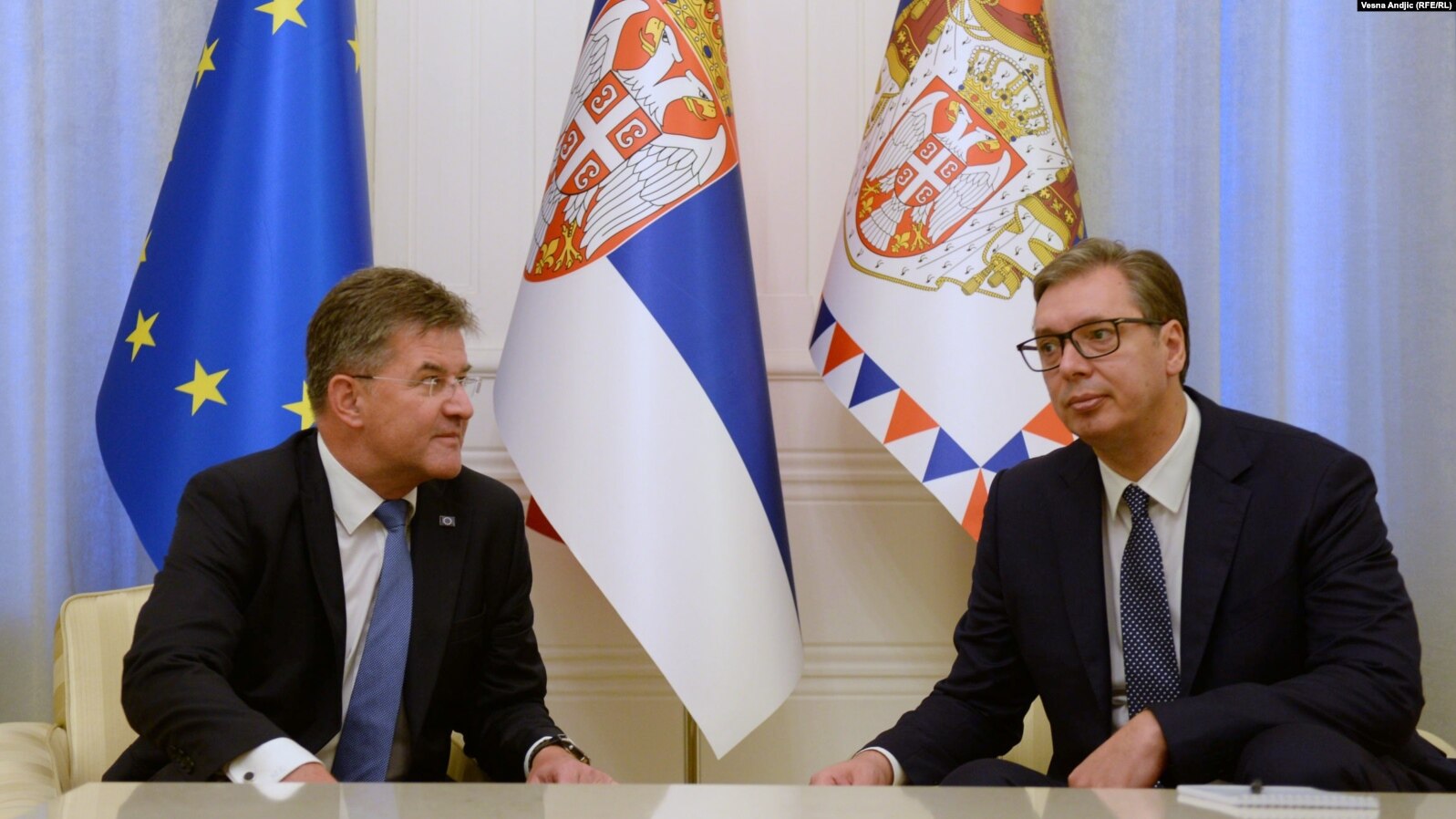
Western powers, particularly the European Union, were able to defuse new tensions between Belgrade and Pristina this month and then they managed to facilitate an important agreement between Serbia and Kosovo at the end of August. In this way, they decreased the likelihood of a new outbreak of violence, particularly in Kosovo’s north, where Serbs primarily live. However, no substantial breakthroughs were still made regarding the status of Kosovo, which is not recognised by Serbia, leaving the issue fundamentally unresolved.
Tensions rose between Belgrade and Pristina late in July, when the Kosovo government declared that, as a reciprocity measure, Serb-issued identity documents and vehicle registration plates with the codes of cities in Kosovo issued by Serbia would no longer be accepted by Pristina. Kosovo- ones are not valid in Serbia for years and Serbian authorities have compelled Kosovo ID holders to obtain special credentials while travelling into Serbia.
At the end of July, Kosovo Serbs reacted intensively, blocking roadways in the Serb-dominated north, and alarming Europe by prompting fears that the violence could escalate. While Belgrade accused Kosovo of coercing integration of minority Serbs in the north, the international community also put pressure on Pristina, mostly behind the curtains. Meanwhile, NATO Secretary-General Jens Stoltenberg has stated that the alliance’s peacekeeping troops are ready to intervene if tensions between Kosovo and Serbia rise, indicating the gravity of the situation.
The situation, however, quickly returned to normal. Indeed, Pristina decided “in collaboration with our international friends, to postpone for 30 days the execution of decisions on automobile license plates and entry-exit paperwork at Serbian border crossings, provided that all barricades are removed, and complete freedom of movement is restored,” Kosovo’s PM Albin Kurti announced, delaying the measures until September 1. Serbs removed the barricades soon after.
A first attempt to solve the situation in a more comprehensive way failed in mid-August, after high-level crisis talks were held in Brussels between Kurti and Serbian President Vucic, facilitated by the EU. The dialogue between the two leaders resumed after almost a year. However, no deal was reached in Brussels. “But this is not the end of the story. Both leaders agreed that the process needs to continue. There is still time until September. I don’t give up,” said Borrel.
The real breakthrough came a few days later, and it was announced near the end of the month, after the US special envoy for the Western Balkans, Gabriel Escobar and EU envoy Miroslav Lajcak met with Vucic in Belgrade and with Kurti in Kosovo. Under the EU-facilitated Dialogue, Serbia agreed to abolish entry/exit documents for Kosovo ID holders and Kosovo agreed to not introduce them for Serbian ID holders,” High Representative Borrell said, ensuring that “this is a European solution.”
Under the new deal, Serbia agreed to abolish entry and exit documents for Kosovo ID holders. In contrast, Kosovo agreed not to introduce similar documents to Serbian ID holders,” Borrell said, adding that “Kosovo Serbs, as well as all other citizens, will be able to travel freely between Kosovo and Serbia using their ID cards.” Borrell noted, however, that the problem with the license plates was not solved and he urged leaders of both countries to find a solution to avoid new incidents in September. The deal on personal documents, very much significant, appeared to be a major concession Belgrade made to calm the situation, but “it cannot be interpreted as recognition of the unilaterally declared independence of Kosovo,” Serbia said.
Even if the issue of IDs was apparently solved, how this will be implemented remains unclear at this stage. Moreover, the unsettled matter of licence plates might still create new troubles in the north of Kosovo anytime soon. Furthermore, the main question – the full ‘normalisation’ of the relationships between Serbia and Kosovo – remains a chimaera, leaving space for new tensions and destabilization.
Further News and Views
Bulgaria, unable to obtain LNG, seeks Russian gas once again
Sources: Euractiv, Bulgarian public radio BNR
Despite the fact that the price was much lower than on European gas exchanges, Bulgaria decided to accept only one of seven liquefied gas supplies from US company Cheniere. After Russian gas deliveries were halted in the spring, US gas supplies would have filled roughly half of Bulgaria’s missing quantities. According to Sofia, the liquefied gas offer was rejected because reserving LNG slots in Turkey and Greece is costly. Meanwhile, Bulgaria’s government announced that it would seek talks with Russian energy giant Gazprom in order to resume natural gas deliveries ahead of the winter season.
Serbia will be without Russian oil from November: Vucic
Source: Novinite, Telegraf, Reuters
Serbia won’t receive Russian oil by tankers across the Adriatic Sea and via pipeline through Croatia after November 1, President Aleksandar Vucic said, without much elaborating. “What are we going to do with electricity, oil? From November 1, there will be no Russian oil for us, we will be under sanctions,” due to restrictions on supplies from Russia caused by new EU sanctions on oil coming into effect in autumn”, Vucic said in an address to the citizens. However, late in August, Vucic noted that Serbia’s finances were resilient enough to secure alternatives to Russian energy to tackle supply shortages expected this year.
Pollution killing thousands in Bosnia: HRW
Source: Fena, HRW, EFB
Bosnia and Herzegovina’s authorities have failed to tackle the country’s air pollution, which kills thousands of people prematurely each year and harms thousands more, Human Rights Watch said this month. Bosnia and Herzegovina’s reliance on coal and wood for heat and coal for electricity makes winter cities among the world’s most polluted. The country ranks fifth in air pollution deaths. The World Bank estimates that 3,300 people die prematurely from air pollution each year, or 9% of all deaths. Pollution is a problem in other countries in the Balkans as well.
EU - NATO
U.S. B-52’s flyover the Balkans
Source: US Air Force
On August 22, two U.S. Air Force B-52 Stratofortresses flew low over North Macedonia, Albania, Montenegro, and Croatia. Washington said each flyover was meant to reassure NATO allies and partners in Southeastern Europe of U.S. commitment for security in the region. The announcement of the flyovers was widely covered in Balkan media, with Al Jazeera saying the exercise could be interpreted as a “demonstration of force” by NATO amid rising tensions.
ECONOMICS
Energy and food crisis looming in the region
Source: ECFR, Bloomberg, UN
Bosnia and Herzegovina’s authorities have failed to tackle the country’s air pollution, which kills thousands of people prematurely each year and harms thousands more, Human Rights Watch said this month. Bosnia and Herzegovina’s reliance on coal and wood for heat and coal for electricity makes winter cities among the world’s most polluted. The country ranks fifth in air pollution deaths. The World Bank estimates that 3,300 people die prematurely from air pollution each year, or 9% of all deaths. Pollution is a problem in other countries in the Balkans as well.

Stefano Giantin
Journalist based in the Balkans since 2005, he covers Central- and Eastern Europe for a wide range of media outlets, including the Italian national news agency ANSA, and the dailies La Stampa and Il Piccolo.

